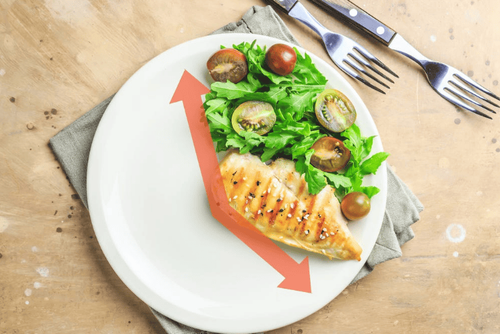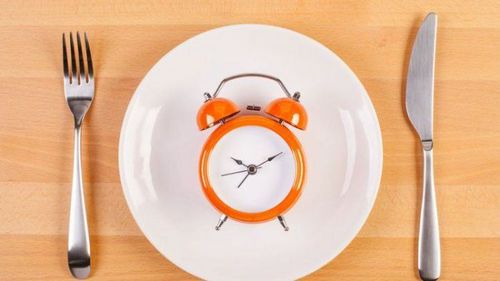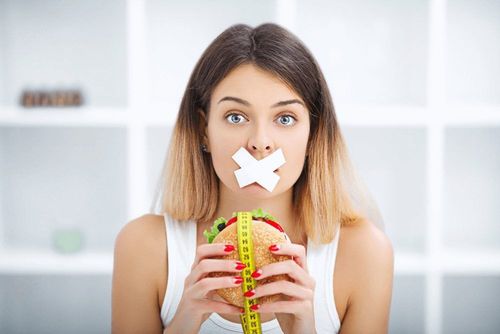This is an automatically translated article.
There are actually many different ways to lose weight. One strategy that has gained popularity in recent years is called fasting. Intermittent fasting is a form of eating that includes regular fasting, fasting for short-term weight loss, or periods of little or no food consumption. Short-term fasting helps people eat fewer calories, which in turn can lead to weight loss over time.
1. What is fasting?
Fasting is not consuming any calories or restricting calorie consumption for a specific period of time. Intermittent fasting is eating on most days but fasting at predetermined times. For example, eating 3 meals a day for 1 week, then 2 days without eating before eating again for 1 week would be considered intermittent fasting (intermittent fasting).
Some diets encourage fasting for weight loss. Fasting people eat only certain foods, but limit calories to less than 800 per day, affirming that you will lose weight quickly.
The cabbage soup diet is an example of a diet that involves weight loss. This diet only eats cabbage soup and drinks water for a certain period of time. Diet plans like this one come with many unproven claims, like losing weight every day for 1 month or removing toxins from your body.
While fasting has the potential to help you lose weight, if done without the supervision of a medical doctor it is a risky practice that can actually lead to more weight gain in the long run and can cause serious health problems.
2. Is fasting to lose weight safe and effective?
Most types of fasting are not safe, nor are they effective for long-term weight loss. Young people in good health can safely do intermittent water fasting, but even they should talk to their doctor about whether they can safely do it. And if so, how should they do it?
Excessive calorie restriction can lead to future weight gain as it both increases your appetite and slows down your metabolic rate. While healthy weight loss programs involve calorie restriction (especially restricting calories from processed foods), they often don't include fasting to lose weight. If the body doesn't get the calories it needs to function properly, it goes into what some call starvation mode, slowing down and storing calories. This slows down the metabolism and makes it difficult to lose weight in the future.
The key to successful weight loss and staying healthy is getting the right amount of calories. Nutritionists and nutritionists can recommend a healthy diet that's right for you and tell you how many calories you should eat based on your current weight, height, and age, and goals. your weight loss.

Hầu hết các kiểu nhịn ăn đều không an toàn, cũng như không có tác dụng giảm cân lâu dài
3. Risks of fasting for prolonged weight loss
Fasting comes with some risks. Fasting (or not getting enough calories and fluids) can cause:
Electrolyte disturbances ; Heart rhythm disturbances; Feeling dizzy or fainting; Dehydration; Gallstones ; Loss of muscle; The metabolic rate decreases; Constipation ; Rapid drops and spikes in blood sugar. People who should never fast include:
Pregnant women; Breastfeeding women; People with diabetes; Children; Elderly; People with chronic diseases.
4. How to fast to lose weight?
Fasting regimens for weight loss vary, but the basic premise is usually started with a strict regimen that only allows water, juice, and/or some kind of laxative concoction. Some plans allow certain types of solid foods, but are still called diets because they provide very few calories.
Not all fasting diets for weight loss are created equal. Some may be completely safe, such as doctor-supervised fasting. Religious and cultural fasting is often performed as an act of devotion, lasts 24-48 hours and is not intended to promote weight loss.
Fasting lasting as long as 1 or 2 days is unlikely to be dangerous for most healthy adults. But people at high risk, the elderly, anyone with a chronic medical condition, pregnant women, and children are advised against fasting of any kind.

Không phải tất cả chế độ nhịn ăn để giảm cân đều như nhau
4.1. The truth about fasting for weight loss Nutrition experts agree that fasting is a way to lose weight but is potentially dangerous and not very effective in losing weight. Instead of fasting to lose weight, choose a healthy eating plan that you can stick with for the long term. A healthy diet provides a minimum of 1,200 calories and includes a variety of fruits, vegetables, whole grains, low-fat dairy, lean protein, and healthy fats, along with regular physical activity.
4.2. The best way to lose weight is to change your lifestyle and eating habits that combine healthy eating and exercise. This will be much more effective in the long run than adopting inappropriate fasting regimens.
Talk to your doctor or see a dietitian before starting any weight loss fasting plan to make sure it's good for your health and doesn't restrict too many calories or nutrients needed for daily activity. day. You should also talk to your doctor about what types of exercise are safe for you and how you need to exercise to achieve optimal health and your weight loss fasting goals.
Here are some tips that your doctor, dietitian and nutritionist can give you on how to fast for safe weight loss:
Work hard most days of the week: Combining a healthy, balanced diet with exercise will help you achieve your health and weight loss goals. Choose exercises you enjoy and are more likely to fit into those exercises. And keep in mind that you don't have to exercise continuously while you're fasting. Just make sure you increase your heart rate. Initially, set a goal of 10,000 steps per day. Drink plenty of water: If it's hard for you to drink a lot of plain water, try adding lemon, other fruit, or cucumber slices to your water. Stay away from soda and sugary drinks: Limit fruit juices, even if it doesn't have added sugar. You're better off eating fruit to get the nutrients and fiber you need. Skip soda and other drinks with artificial sweeteners: A new long-term study finds that women who drink two or more diet sodas a day have an increased risk of stroke and cardiovascular disease. increased significantly. Eat more fresh vegetables: A good rule of thumb is to eat darker vegetables and eat a variety of colors. Green vegetables are a great choice. Leafy greens are a great way to make sure you're getting plenty of nutrition without a lot of calories or unhealthy fats. For example, avocados are a great source of healthy fats and are also high in folic acid. Choose lean protein: Protein is an important part of any diet, but some types of protein are better than others. If you eat meat, choose white meat poultry (such as chicken or turkey), fish, nuts, legumes (beans, peas, peanuts, alfalfa) and low-fat dairy (milk, small cheese). Eggs are also a good source of protein, but they contain fat and cholesterol, so talk to your doctor or dietitian about how many eggs you should eat each week. Avoid processed meats: Processed meats are full of sodium and other preservatives. There are a few nitrite and nitrate free lunch dishes, but most are still high in sodium. Cold cuts, beef, and hot dogs are also not the best options for health and weight loss. Use whole grains: When you choose bread, pasta, or crackers, choose those that have whole grains as the first ingredient. Oats are also a great alternative to whole grains. Try to stay away from white bread or anything with bleached flour. You need to make sure you eat complex carbohydrates. Don't worry too much; Having a healthy lifestyle and eating well doesn't mean you can never eat salty or sweet, just don't eat them every day. If you fast too much, you'll be less able to adapt to lifestyle changes.
Please dial HOTLINE for more information or register for an appointment HERE. Download MyVinmec app to make appointments faster and to manage your bookings easily.
Reference source: beaumont.org, webmd.com












